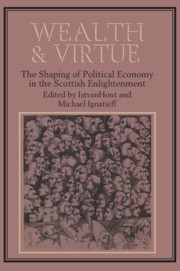Book contents
- Frontmatter
- Contents
- Preface
- List of abbreviations
- 1 Needs and justice in the Wealth of Nations: an introductory essay
- 2 Where had the Scottish economy got to by the third quarter of the eighteenth century?
- 3 Gershom Carmichael and the natural jurisprudence tradition in eighteenth-century Scotland
- 4 The Scottish professoriate and the polite academy, 1720–46
- 5 From applied theology to social analysis: the break between John Locke and the Scottish Enlightenment
- 6 The Scottish Enlightenment at the limits of the civic tradition
- 7 Adam Smith as civic moralist
- 8 The legal needs of a commercial society: the jurisprudence of Lord Kames
- 9 Cambridge paradigms and Scotch philosophers: a study of the relations between the civic humanist and the civil jurisprudential interpretation of eighteenth-century social thought
- 10 Adam Smith's ‘enduring particular result’: a political and cosmopolitan perspective
- 11 The ‘rich country–poor country’ debate in Scottish classical political economy
- 12 John Millar and individualism
- 13 Scottish echoes in eighteenth-century Italy
- Index
3 - Gershom Carmichael and the natural jurisprudence tradition in eighteenth-century Scotland
Published online by Cambridge University Press: 05 June 2012
- Frontmatter
- Contents
- Preface
- List of abbreviations
- 1 Needs and justice in the Wealth of Nations: an introductory essay
- 2 Where had the Scottish economy got to by the third quarter of the eighteenth century?
- 3 Gershom Carmichael and the natural jurisprudence tradition in eighteenth-century Scotland
- 4 The Scottish professoriate and the polite academy, 1720–46
- 5 From applied theology to social analysis: the break between John Locke and the Scottish Enlightenment
- 6 The Scottish Enlightenment at the limits of the civic tradition
- 7 Adam Smith as civic moralist
- 8 The legal needs of a commercial society: the jurisprudence of Lord Kames
- 9 Cambridge paradigms and Scotch philosophers: a study of the relations between the civic humanist and the civil jurisprudential interpretation of eighteenth-century social thought
- 10 Adam Smith's ‘enduring particular result’: a political and cosmopolitan perspective
- 11 The ‘rich country–poor country’ debate in Scottish classical political economy
- 12 John Millar and individualism
- 13 Scottish echoes in eighteenth-century Italy
- Index
Summary
No discussion of the origins of the Scottish Enlightenment would be complete without an expression of homage to Gershom Carmichael, the first occupant of the Chair of Moral Philosophy at the University of Glasgow and the predecessor of Francis Hutcheson and Adam Smith. He has sometimes been called, following Sir William Hamilton, ‘the real founder of the Scottish school of philosophy’, but it is not entirely clear what Sir William Hamilton intended to convey by this pronouncement. His teaching and writings have been characterized more cautiously but perhaps more judiciously by James McCosh as ‘the bond which connects the old philosophy with the new in Scotland’. Clearly Carmichael was a transitional thinker of some importance; but McCosh's description, like Sir William Hamilton's, continues to beg the question: in what respect may Carmichael be considered an innovator in his teaching and in his writing? He was not a philosopher of common and of moral sense like the 3rd Earl of Shaftesbury and Francis Hutcheson; Carmichael was aware of this development in moral philosophy in the early eighteenth century and he rejected it. He did not claim to be an experimental philosopher or to be the Newton of the moral sciences; this distinction was claimed by and for later thinkers of the Scottish Enlightenment, more sceptical in their approaches to moral and political philosophy than Carmichael.
- Type
- Chapter
- Information
- Wealth and VirtueThe Shaping of Political Economy in the Scottish Enlightenment, pp. 73 - 88Publisher: Cambridge University PressPrint publication year: 1983
- 25
- Cited by

